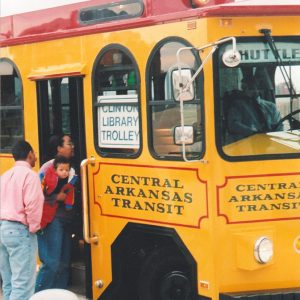calsfoundation@cals.org
Rock Region Metropolitan Transit Authority
aka: Central Arkansas Transit Authority (CATA)
The Rock Region Metropolitan Transit Authority (Rock Region METRO), previously the Central Arkansas Transit Authority (CATA), is the largest public transit agency in Arkansas. Rock Region METRO provides public transportation services for the metropolitan Little Rock (Pulaski County) area seven days a week. The twenty-two fixed routes and four express commuter routes provide transportation service to 10,000 riders every weekday. A “demand response” Americans with Disabilities Act (ADA) para-transit service operates alongside the fixed route hours and coverage area. A heritage streetcar system called the River Rail System operates approximately 3.4 miles of track throughout downtown Little Rock and North Little Rock (Pulaski County). The agency also offers a microtransit service (on-demand, point-to-point, shared-ride trips) within select communities.
Prior to the creation of CATA, the public transit system was owned and operated by private corporations. Until 1950, the transit system was owned by Arkansas Power and Light Company (AP&L). In 1950, AP&L sold the system, Capital Transportation Company (CTC), to a group of investors. A strike by the transit union, Amalgamated Transit Union Division No. 704, in 1955 left the company with a ruined reputation and worsened its existing financial problems. The governments of Little Rock and North Little Rock awarded the franchise to a new company, Citizens’ Coach Company (CCC), on February 28, 1956. Although the new company was backed by a group of local unions, the same financial problems that CTC had encountered led to the demise of CCC by 1962.
The declining passenger revenue and rising wages left few resources to maintain the bus fleet. Following the takeover of the transit system by Twin City Transit (TCT) on September 25, 1962, the federal government began offering funds to struggling transit systems through various assistance programs. This funding assisted TCT with purchasing new buses, and TCT experienced some financial success. But the increase in passenger revenue was temporary, as TCT could not keep up with offering service in the expanding cities without continuing to receive fare increases.
A 1971 study recommended that the transit system shift to public ownership under the direction of a regional authority. CATA officially began operations under the trusteeship of Metroplan in May 1972. As a regional planning entity, Metroplan lacked the resources to supervise a transit operation indefinitely. Local government partners were being asked to infuse more money into the operation, and therefore they wanted more direct control than the original 1972 agreement granted. On July 14, 1986, CATA was chartered when the governments of Pulaski County and the cities of Little Rock, North Little Rock, Cammack Village (Pulaski County), Maumelle (Pulaski County), Sherwood (Pulaski County), and Jacksonville (Pulaski County) entered into an interlocal agreement that established CATA as a public corporation.
On November 1, 2004, Phase I of the River Rail Streetcar System began revenue operations. In February 2007, a second phase provided service to the Clinton Presidential Center and the headquarters of Heifer International. Three replica vintage streetcars operate on the 3.4-mile route linking Little Rock and North Little Rock. The streetcars operate on an overhead power supply and travel across the Main Street Bridge over the Arkansas River to connect the two cities. In January 2015, the board of the CATA voted to change the agency’s name to the Rock Region Metropolitan Transit Authority (Rock Region METRO). This name change became effective in August 2015.
In 2020, during the COVID-19 pandemic, the agency cut a total of nine lines, with most of the cuts being made permanent. These included routes serving Maumelle, Jacksonville, Sherwood, and College Station (Pulaski County), as well as the Hensley Express, serving communities in southeastern Pulaski County, most notably Wrightsville (Pulaski County).
In late June 2021, Rock Region METRO received a $4.9 million grant from the federal government for the purchase of five electric buses and charging infrastructure. The $5.6 million deal was finalized in April 2022, keeping it in line with its plans to retire its remaining diesel buses by 2025. In 2023, Rock Region METRO added five electric buses to its fleet, becoming the first mass transit authority in the state to begin using rechargeable vehicles.
Rock Region METRO is governed by a twelve-member board of directors appointed by local elected officials of the cities of Little Rock, North Little Rock, Maumelle, and Sherwood, as well as the government of Pulaski County. The agency employs approximately 200 and is headquartered at 901 Maple Street in North Little Rock.
For additional information:
Eichkorn, Paige. “Rock Region Metro Rolls out First 5 Electric Buses in State.” Arkansas Democrat-Gazette, June 14, 2023, pp. 1B, 2B. Online at https://www.arkansasonline.com/news/2023/jun/14/rock-region-metro-rolls-out-first-5-electric/ (accessed December 3, 2025).
Mahmoud, Amir. “Pulaski County Cities See Transit Loss’s Effect.” Arkansas Democrat-Gazette, September 29, 2025, pp. 1A, 3A. Online at https://www.arkansasonline.com/news/2025/sep/28/pulaski-county-cities-see-effects-of-fewer-bus/ (accessed December 3, 2025).
Miano, Lena. “Metro Board OKs Partner for Overhaul.” Arkansas Democrat-Gazette, July 24, 2024, pp. 1B, 5B. Online at https://www.arkansasonline.com/news/2024/jul/23/rock-region-metros-board-votes-to-move-forward/ (accessed December 3, 2025).
Oman, Noel. “Rock Region Metro Buys 5 e-Buses.” Arkansas Democrat-Gazette, April 27, 2022, pp. 1B, 8B. Online at https://www.nwaonline.com/news/2022/apr/27/rock-region-metro-approves-56m-purchase-of-its/ (accessed December 3, 2025).
Patty, William Jordan. “Little Rock Public Transit in Postwar America, 1950–1972.” MA thesis, University of Arkansas, 2003.
Rock Region METRO. http://www.rrmetro.org/ (accessed December 3, 2025).
Darrell W. Brown
Central Arkansas Transit Authority






Comments
No comments on this entry yet.